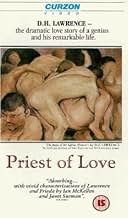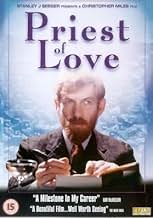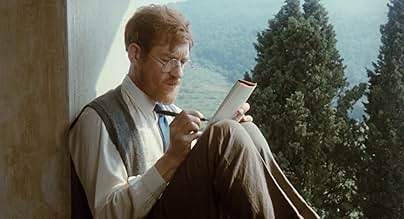Following the banning and burning of his novel, "The Rainbow", D.H. Lawrence and his wife, Frieda, move to the United States, and then to Mexico. When Lawrence contracts tuberculosis, they r... Read allFollowing the banning and burning of his novel, "The Rainbow", D.H. Lawrence and his wife, Frieda, move to the United States, and then to Mexico. When Lawrence contracts tuberculosis, they return to England for a short time, then to Italy, where Lawrence wrote "Lady Chatterley's ... Read allFollowing the banning and burning of his novel, "The Rainbow", D.H. Lawrence and his wife, Frieda, move to the United States, and then to Mexico. When Lawrence contracts tuberculosis, they return to England for a short time, then to Italy, where Lawrence wrote "Lady Chatterley's Lover".
- Director
- Writers
- Stars
- Dr. Uhfelder
- (as Mike Morris)
- Director
- Writers
- All cast & crew
- Production, box office & more at IMDbPro
Featured reviews
The film is just a bog standard biopic done from the write by numbers playbook. It hardly ever come close to the real D H Lawrence. The facts and events are there, all the wandering around the world etc, but you only have to read Lawrence's collected letters to know that the picture given here is rather superficial It isn't helped by some amateur dramatics style acting, particularly from a way below par Ian McKellen and Janet Suzman. A pet hate of mine is the lazy generic Northern accent adopted by most actors doing D H Lawrence. Ian McKellen made him sound as though he was brought up in Yorkshire rather than Notts. Admittedly the Nottingham/Derbyshire accent is hard to do. Robert Lindsey does it well, but then he comes from Ilkeston.
The other thing missing in this film is a sense of D H Lawrence's wit and humour, which can be seen very well in his letters, short stories and some of his poems. I also didn't like the way the script writer (Alan Plater in his soap writing mood) somewhat lazily bought into the feminist critique of the 1980s. D H Lawrence, who wrote very sensitively on women's issues, is made to seem as though he was a male chauvinist. Again, a more careful reading of his works would have shown this to be untrue.
So, overall, a pleasant enough journey round the world with some nice scenery and some good support actors. As another reviewer has pointed out, a bit like a dramatisation of an encyclopedia entry.
It is therefore perhaps not surprising that after the war Lawrence and Frieda decided to leave Britain and to lead a peripatetic existence wandering around the world, a journey that would take them to France, Italy, Australia, Mexico and the USA. They did so partly because Lawrence needed a warmer climate for the sake of his health- he was suffering from the tuberculosis that would eventually kill him- but the way in which he had been treated in the UK must also have been a factor. The film follows them on their journey and also deals with the writing of Lawrence's last and most controversial novel, "Lady Chatterley's Lover", compared to which "The Rainbow" is about as racy as a children's nursery rhyme.
Although the film features some major names of the British cinema and a bona fide Hollywood goddess in the shape of Ava Gardner, it seems to have aroused little attention. It was not a success on its release in 1981, and I had never heard of it before I recently caught it on television. I note that mine is only the third review of it on this site which suggests that few other people had heard of it either.
And the reason nobody seems to have heard of it is that, frankly, it is not very good. Probably the best acting comes from John Gielgud in a cameo as the pompous Herbert G. Muskett, the reactionary functionary charged with protecting the British people from exposure to literature and who seemed to take a particular delight in persecuting Lawrence. None of the other cast members, however, stand out. Although the title hints at Lawrence's passionate nature, you get little idea of this from Ian McKellen's surprisingly passionless performance. Janet Suzman's Frieda seems too unsympathetic, with the sort of cinematic German accent more normally associated with Nazis barking "ve haff vays und means". Both these performances came as a disappointment to me, because both McKellen and Suzman have been much better in other films.
The screenplay was based upon a non-fiction biography of Lawrence, not always the best source to use when making a fictionalised biopic. The resulting film is just a tedious drawn-out chronicle of two people, one of them seriously ill, journeying around the world, with various artistic and literary celebs from the 1920s occasionally popping up. ("Oh look! Is that Aldous Huxley over there? And could that be Katherine Mansfield? Quick, or else you'll miss her"). Screenwriter Alan Plater and director Christopher Miles might just as well have tried to film the entry on Lawrence from the Encyclopaedia Britannica. Had they done so the result could hardly have been duller than what they actually came up with. 4/10
I might have remembered that Mr. Lawrence had written 'Lady Chatterley's Lover' had I been pressed for an answer at a quiz, but other than that I knew very little about him at all and might even have assumed that D. H. might have stood for Dorothy Helen without looking it up, so ultimately it was interesting to learn more about the literary great.
And while the story wasn't particularly rife with extraordinary events happening throughout, the authors life and character were still intriguing, especially to me, as a rookie novelist.
Lawrence was obviously an intelligent man and creative, but with a flair for a reverse extravagance, in the way that he shunned things and money, but still enjoyed the life that they brought. He appeared to be of a mind like my own, in respect to how literature should be a real representation of life and that sex is a part of that to be acknowledged and enjoyed.
In that lead role Ian McKellen was as superb as ever and he played it with great personality. Whether he was accurately depicting the real Lawrence or not, I could not say, because I knew so little about him, but the performance certainly sparked an interest in reading his complete works and perhaps even a biography of the man.
There were a lot of homosexual suggestions regarding Lawrence's connections with other men, but nothing definitively depicted. If he did have dalliances with men, for the sake of accuracy and for my own enjoyment, I would have liked to have seen it represented. As a gay man, it is nice to have my lifestyle acknowledged in cinema and to see that some of the greatest minds have felt the same way too. It builds on my own aspirations.
And I would have liked to have seen a lot more of Jorge Rivero (Tony Luhan) and Massimo Ranieri (Piero Pini), if you know what I mean.
The other actors all seemed to deliver their roles well too, perhaps with the exception of Penelope Keith, who although she was fine, in her part of The Honourable Dorothy Brett, it was a bit like Margot Leadbetter* had given up Surbiton and finally understood the appeal of Tom and Barbara's more adventurous nature, but she was still essentially the same character. We all knew that her and Gerry were swingers anyway. All those bowls in her house to swap keys in.
I've digressed.
Although the story didn't move anywhere specific in particular, it was still a pleasure to watch. I was initially a bit worried that the film wouldn't live up to my expectations, because I really do enjoy a good biopic provided the person is worthy, but Mr. McKellen certainly brought life to this one.
719.59/1000.
*'The Good Life' (1975-8).
The lead performances are believable and interesting and the second half is more accessible and enlightening than the first as you get closer to the couple's lives and Lawrence's vigorous self belief. The first half though is played out too fast, moving very quickly across the globe with the man having hissy fits with little explanation. Nice support from Penelope Keith.
Probably needs watching more than once.
Did you know
- TriviaThis movie was released on the 51st Anniversary year of the death of author D.H. Lawrence.
- Quotes
Herbert G. Muskett: [looking at a copy of Lawrence's book "Kangaroo"] It does not appear to be obscene in absolutely legal terms. Anti-British to the point of insanity.
Clerk to Herbert G. Muskett: Apparently, Mr. Lawrence is going to America.
Herbert G. Muskett: We must inform the authorities.
Clerk to Herbert G. Muskett: It's been attended to, Mr Muskett.
[reaching for the book]
Clerk to Herbert G. Muskett: Shall I take this?
Herbert G. Muskett: Leave it. I shall read it again. To make absolutely sure
[recommences intense study of the book]
- Alternate versionsAn abridged 99 minute "Centenary version" was released in 1985 in the UK to better box office and critical acclaim to commemorate the birth of D.H.Lawrence. As well as inevitable cutting of some material the shortened version also rearranges the placement of some of the flashback sequence and ends with Lawrence's death excluding the New Mexico epilogue. The short version is a properly re-prepared effort however with the appearance order end-credits redone to reflect the new positions in which characters first appear. Copies of the 1981 version, which was first released in the UK during the 1982 Falklands War when theatre going plummeted, now no longer exist.
- SoundtracksThe Way We Get It Together
music by Francis James Brown and Stanley Joseph Seeger (as Joseph James)
Lyrics by Christopher Cone
Played by The Pasadena Roof Orchestra
- How long is Priest of Love?Powered by Alexa






































